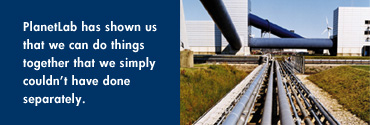
Like many great ideas, the next generation of the Internet
was born out of frustration.
In 2002, Princeton Computer Science Chair Larry Peterson
had a problem: The computer science community was buzzing
with a new generation of applications and services – and
nowhere to run them. These services – Web content distribution,
media distribution, an adaptive form of Webcasting called
multicasting, efficient file transfers, wide-area storage
systems, worm tracking, and network monitoring – had
to run everywhere, all the time, and nobody had access to
a computational services network that ran all over the world.
So Peterson decided to build one.
“Everybody contributed a computer or two, creating
an instant, shared services network where we could test and
deploy this new generation of network services," he
recalls.
And thus PlanetLab was born in June 2002. HP threw its support
behind the initiative in April 2003, joining the consortium
as a charter industrial sponsor.
"PlanetLab is collaborative research at its best. Neither
we, nor Intel, nor Berkeley, nor Princeton alone could create
the next-generation Internet services that will be born in
PlanetLab," says Patrick Scaglia, director of the Internet
and Computing Platforms Research Center in HP Labs and a
vice president for research, HP. “More than being just
a research facility, PlanetLab has spurred us in entirely
new directions."
Today, PlanetLab consists of 530 nodes at more than 200
sites worldwide. It’s become a backbone of research
and education networks in Canada, Brazil, China and the United
States. PlanetLab membership is expected to double by the
end of 2006 as universities and companies join the consortium.
Google, AT&T, France Telecom and the U.S. Public Broadcasting
Service (PBS) have joined Intel and HP as corporate members.
With a worldwide computing utility like PlanetLab, researchers
-- from HP, Intel, Google, Princeton University, the University
of California at Berkeley, Carnegie-Mellon University, the
University of Washington and elsewhere -- can do completely
new things and perform existing tasks much more reliably
and robustly. Serving as a deployment platform, collaboration
vehicle and world-class test bed, PlanetLab has helped researchers
to speed up file transfer, reduce the cost of webcasts, track
the spread of worms, develop stronger file protection, and
much more.
“Even more than the specific projects, PlanetLab has
achieved two key miracles,” says Rick McGeer, HP program
manager for PlanetLab. “It’s the first democractic
world-class experimental facility in any field -- any university
can join just for the price of a couple of PCs and by allocating
some bandwidth."
What's more, adds McGeer, PlanetLab has provided a platform
for cross-institutional collaboration. "Previously,
if people wanted to collaborate on some project, they had
to go through a maze of logistics to make that happen," he
says. "Now, it’s easy: Just set up a shared slice
on PlanetLab."
Such global collaborations form the heart of two major projects
on PlanetLab. In one, HP is heading a three-company, four-university
consortium designed to make Internet applications more robust
and secure by using a common distributed program to route
data around the Internet. This program can make routing decisions
based on remote information, avoiding hot spots, congestion
and other problems. So if some parts of the Internet fail,
system operators could still be able to route data without
users experiencing slowed service or disruption.
The project requires that all seven institutions in the
consortium can easily interact, and that technologies contributed
by each institute can work together seamlessly.
"Not long ago, just putting all that together would
have been a nightmare," recalls HP Labs researcher Jack
Brassil, HP's technical lead for PlanetLab. "Today,
putting a big project involving many organizations together
in a few months is not only possible, it’s quite tractable.”
The other project, co-led by HP, is an effort to distribute
high-definition television signals for PBS. It, too, is highly
complex, involving numerous technologies and institutions.
Instead of worrying about logistics, says Brassil, "we
can focus on solving the problem – in this case, getting
nine channels’ worth of TV programming from PBS in
Washington to 180 affiliates around the United States.”
 |
|
- Better Web content distribution: Existing
Web servers can be overwhelmed by unusually heavy traffic.
CoDeeN, an experimental content distribution network on
PlanetLab, aims to avoid this problem by storing frequently
requested pages throughout the network, replicating popular
pages and serving up the stored pages where possible. By
using many sites throughout the network, CoDeeN can potentially
store and replicate many more pages than conventional Web
proxies; its network of Web proxies, therefore offers much
faster Web performance and prevents servers from being
overwhelmed.
- Stronger file protection: Currently,
a computer userís files are stored in one location only,
making users and their data vulnerable to various local
disruptions such as power failures, a local loss of connectivity,
or a disk crash. A new Internet-wide file system known
as OceanStore is designed to eliminate vulnerabilities
by operating as an Internet-wide Redundant Array of Independent
Disks (RAID) system. Instead of using multiple disks on
a single machine to make redundant copies as RAID systems
do, the system spreads those disks over multiple machines.
The goal is of the project to make it impossible to corrupt
a file and to allow system operators to do backups by copying
from disk to disk -- so that, potentially, a file could
last for a thousand years.
- End-system multicast: Currently, Webcasts
are extremely expensive and difficult to set up. End-system
multicast, from Carnegie-Mellon, sets up an ad-hoc multicast
tree that any new user can join, dropping the cost of Webcast
to the cost of a conference call.
- Worm tracking: Because PlanetLab is
global, researchers at Intel learned they could track the
spread of worms globally, simply by logging requests to
a PlanetLab server. By studying this data, they discovered
that 60 percent of all worms originated from just 10 IP
addresses. This knowledge could lead to development of
an early-warning monitoring service; network administrators
could subscribe and then refuse connections from infected
IP addresses. No more worms.
- More efficient file transfer: File
transfer is currently handled point-to-point, even when
large files are transferred to many recipients simultaneously.
Transmitting the whole file, one copy at a time, to each
recipient, overuses bandwidth at the source without ever
tapping the recipients' bandwidth. Lucy Cherkasova of HP
Labs proposed a solution called FastReplica,
in which the sources break the file into numerous pieces
and transmit one piece to ach recipient. The recipients
each transmit their piece to every other recipient, resulting
in potentially much faster and more efficient file broadcast.
- Faster, more efficient network monitoring: All
the above applications are dependent on network conditions
both locally and remotely. As a result, sensing applications –applications
that discover and report on network conditions – are
widespread on PlanetLab. One of these is a system developed
by Puneet Sharma, Sujata Banerjee, Sung-Ju Lee and Sujoy
Basu of HP Labs that is designed to efficiently determine
nearest neighbors and bandwidth on the network. The conventional
approach to measuring distance between two sites is for
one to send a short message, called a ping, to the other,
and measure the time it takes the second site to respond.
This method is inefficient because it requires messages
between each pair of sites -- so measuring the distance
between all pairs of sites in a 1,000-site network would,
for instance, generate a million messages. Most new methods
that require a small number of measurements from each node
suffer from lack of accuracy and are adversely affected
by incomplete or erroneous measurements. The HP Labs system uses
novel clustering techniques to find nearest neighbors with
low-measurement overhead. This system is not only efficient,
but also designed to be highly accurate and robust to measurement
errors, making it practical to use in very large networks.
- Wide-area caching services: The Logistical
Computer Infrastructure out of the University of Tennessee,
Knoxville, offers wide-area caching services, liberating
people from the need to provision and cache local storage.
 |
|
Some new HP projects on PlanetLab include an effort to build
an adaptive wide-area distributed system management platform,
a project involving Dejan Milojicic of HP Labs and Intel’s
Robert Adams. Kevin Lai of HP Labs and Rob Knauerhause of
Intel are working on a joint project to provide sophisticated,
market-based resource allocation, and provable isolation
and security to distributed applications.
“PlanetLab has become a centerpiece of our relationship
with HP,” says Mic Bowman, Intel distinguished engineer
and the architect of the PlanetLab kernel.
In addition to two joint innovation programs, HP and Intel
teamed to build out the Brazil and Chinese national research
networks, and they are partners in an initiative to develop
commercial services on PlanetLab. Says Bowman, “PlanetLab
has shown us that we can do things together that we simply
couldn’t have done separately.”
|
 |


|

